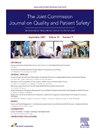Improving Screening for Alpha-1 Antitrypsin Deficiency in Adults with COPD
IF 2.4
Q2 HEALTH CARE SCIENCES & SERVICES
Joint Commission journal on quality and patient safety
Pub Date : 2025-07-11
DOI:10.1016/j.jcjq.2025.07.002
引用次数: 0
Abstract
Background
Alpha-1 antitrypsin deficiency (AATD) is an underrecognized hereditary condition affecting approximately 2% of patients with chronic obstructive pulmonary disease (COPD) in the United States. Studies show a correlation between AATD and COPD progression, with a five-year mortality rate of 19% in severe AATD. National costs attributed to COPD were approximately $32.1 billion in 2010 and an estimated $49 billion in 2020. Chart audits at Onvida Health revealed that only 2.0% of patients diagnosed with COPD were tested for AATD. The authors aimed to improve effective care through AATD testing in adult patients with COPD in the primary care setting to 75% in an eight-week time frame.
Methods
Baseline data were obtained from chart audits for patients with COPD and patient/staff surveys. The implementation spanned eight weeks using a Plan-Do-Study-Act (PDSA) process consisting of four cycles and two core interventions analyzed every two weeks. A shared decision-making checklist was developed for AATD screening and testing. A standard of care log constructed from current evidence was implemented for all patients with COPD.
Results
Testing rates improved to 38.1% from a baseline of 2.0%. Although there was a 0.0% positivity rate for the diagnosis of AATD (two abnormal alleles), 19.7% (n = 12 of 61) of patients were identified as AATD carriers (one abnormal and one normal allele).
Conclusion
Utilizing standard of care can aid in disease prevention and prevent progression with early identification of patients with AATD. Suggested next steps include lengthier studies to evaluate the carriers and their offspring.
改善成人COPD患者α -1抗胰蛋白酶缺乏症的筛查。
背景:α -1抗胰蛋白酶缺乏症(AATD)是一种未被充分认识的遗传性疾病,影响了美国约2%的慢性阻塞性肺疾病(COPD)患者。研究表明AATD与COPD进展之间存在相关性,严重AATD的5年死亡率为19%。2010年,全国因慢性阻塞性肺病造成的成本约为321亿美元,2020年估计为490亿美元。Onvida Health的图表审计显示,只有2.0%的慢性阻塞性肺病患者接受了AATD检测。作者的目标是通过AATD测试在初级保健环境中提高成人COPD患者的有效护理,在8周的时间框架内达到75%。方法:基线数据来自慢性阻塞性肺病患者的图表审计和患者/工作人员调查。实施时间长达8周,采用计划-实施-研究-行动(PDSA)流程,包括四个周期,每两周分析两个核心干预措施。制定了AATD筛查和检测的共享决策清单。根据现有证据构建的标准护理日志对所有COPD患者实施。结果:检测率从基线的2.0%提高到38.1%。虽然AATD的诊断阳性率为0.0%(2个异常等位基因),但在61例患者中,有19.7% (n = 12)的患者被鉴定为AATD携带者(1个异常等位基因和1个正常等位基因)。结论:早期发现AATD患者,采用标准护理有助于疾病预防和预防进展。建议下一步包括对携带者及其后代进行更长期的研究。
本文章由计算机程序翻译,如有差异,请以英文原文为准。
求助全文
约1分钟内获得全文
求助全文
来源期刊

Joint Commission journal on quality and patient safety
HEALTH CARE SCIENCES & SERVICES-
CiteScore
3.80
自引率
4.30%
发文量
116
审稿时长
49 days
 求助内容:
求助内容: 应助结果提醒方式:
应助结果提醒方式:


